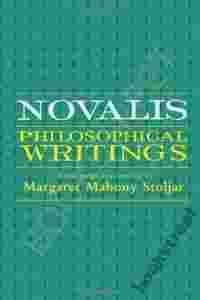|
This first scholarly edition in English of the
philosophical writings of Novalis (Friedrich von
Hardenberg), the German Romantic poet, philosopher, and
mining engineer, includes two collections of fragments
published in 1798, Miscellaneous Observations and
Faith and Love, the controversial essay
Christendom or Europe, and substantial selections
from his unpublished notebooks.
Novalis:
Philosophical Writings is the first extensive
scholarly translation in English from the philosophical
work of the late eighteenth-century German Romantic
writer Novalis (Friedrich von Hardenberg). His original
and innovative thought explores many questions that are
current today, such as truth and objectivity, reason and
the imagination, language and mind, and revolution and
the state.
The translation includes two collections
of fragments published by Novalis in 1798,
Miscellaneous Observations and Faith and
Love, and the controversial essay Christendom or
Europe. In addition there are substantial selections
from his unpublished notebooks, including Logological
Fragments, the General Draft for an
encyclopedia,the Monologue on language, and the
essay on Goethe as scientist.
"A reliable, faithful,
and readable English translation of Novalis's
influential philosophical and aesthetic writings has
been a conspicuous desideratum in Anglo-Saxon
scholarship on German Romanticism. Stoljar's book fills
this gap in every respect and is, therefore, most
welcome and timely. The translation is impeccable and
reflects the often highly complex original texts most
felicitously. Stoljar's introduction is a model of sound
and up-to-date critical scholarship: it provides
circumspect exposure to Novalis as an independent and
imaginative thinker, situates and characterizes the
individual texts in the overall context of Novalis's
conceptual universe, and abounds in clearly formulated
interpretive insights.
"In Stoljar's lucid
translation, Novalis's writings come across as
fascinating and seminal as they are in the German
original; the collection is a veritable eye-opener for
anyone concerned with the wide-ranging impact of the
best of German Romantic thought on subsequent
developments in European literature, philosophy,
history, science, psychology, music, the visual arts,
etc., in other words, across the entire cultural
landscape through the nineteenth century to the
present." -- Steven Paul Scher, Dartmouth College
|
|

